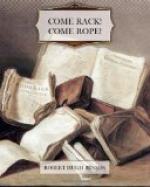* * * * *
Robin’s mind had worked fiercely and intently since the encounter in the hall. His father had sat silent both at supper and afterwards, and the next day was the same; the old man spoke no more than was necessary, shortly and abruptly, scarcely looking his son once in the face, and the rest of the day they had not met. It was plain to the boy that something must follow his defiance, and he had prepared all his fortitude to meet it. Yet the second night had passed and no word had been spoken, and by the second morning Robin could bear it no longer; he must know what was in his father’s mind. And now the appointment was made, and he would soon know all. His father was absent from dinner and the boy dined alone. He learned from Dick Sampson that his father had ridden southwards.
* * * * *
It was not until Robin had sat down nearly half an hour later than supper-time that the old man came in. The frost was gone; deep mud had succeeded, and the rider was splashed above his thighs. He stayed at the fire for his boots to be drawn off and to put on his soft-leather shoes, while Robin stood up dutifully to await him. Then he came forward, took his seat without a word, and called for supper. In ominous silence the meal proceeded, and with the same thunderous air, when it was over, his father said grace and made his way, followed by his son, into the parlour behind. He made no motion at first to pour out his wine; then he helped himself twice and left the jug for Robin.
Then suddenly he began without moving his head.
“I wish to know your intentions,” he said, with irony so serious that it seemed gravity. “I cannot flog you or put you to school again, and I must know how we stand to one another.”
Robin was silent. He had looked at his father once or twice, but now sat downcast and humble in his place. With his left hand he fumbled, out of sight, Mr. Maine’s pair of beads. His father, for his part, sat with his feet stretched to the fire, his head propped on his hand, not doing enough courtesy to his son even to look at him.
“Do you hear me, sir?”
“Yes, sir. But I do not know what to say.”
“I wish to know your intentions. Do you mean to thwart and disobey me in all matters, or in only those that have to do with religion?”
“I do not wish to thwart or disobey you, sir, in any matters except where my conscience is touched.” (The substance of this answer had been previously rehearsed, and the latter part of it even verbally.)
“Be good enough to tell me what you mean by that.”
Robin licked his lips carefully and sat up a little in his chair.
“You told me, sir, that it was your intention to leave the Church. Then how can I tell you of what priests are here, or where mass is to be said? You would not have done so to one who was not a Catholic, six months ago.”




